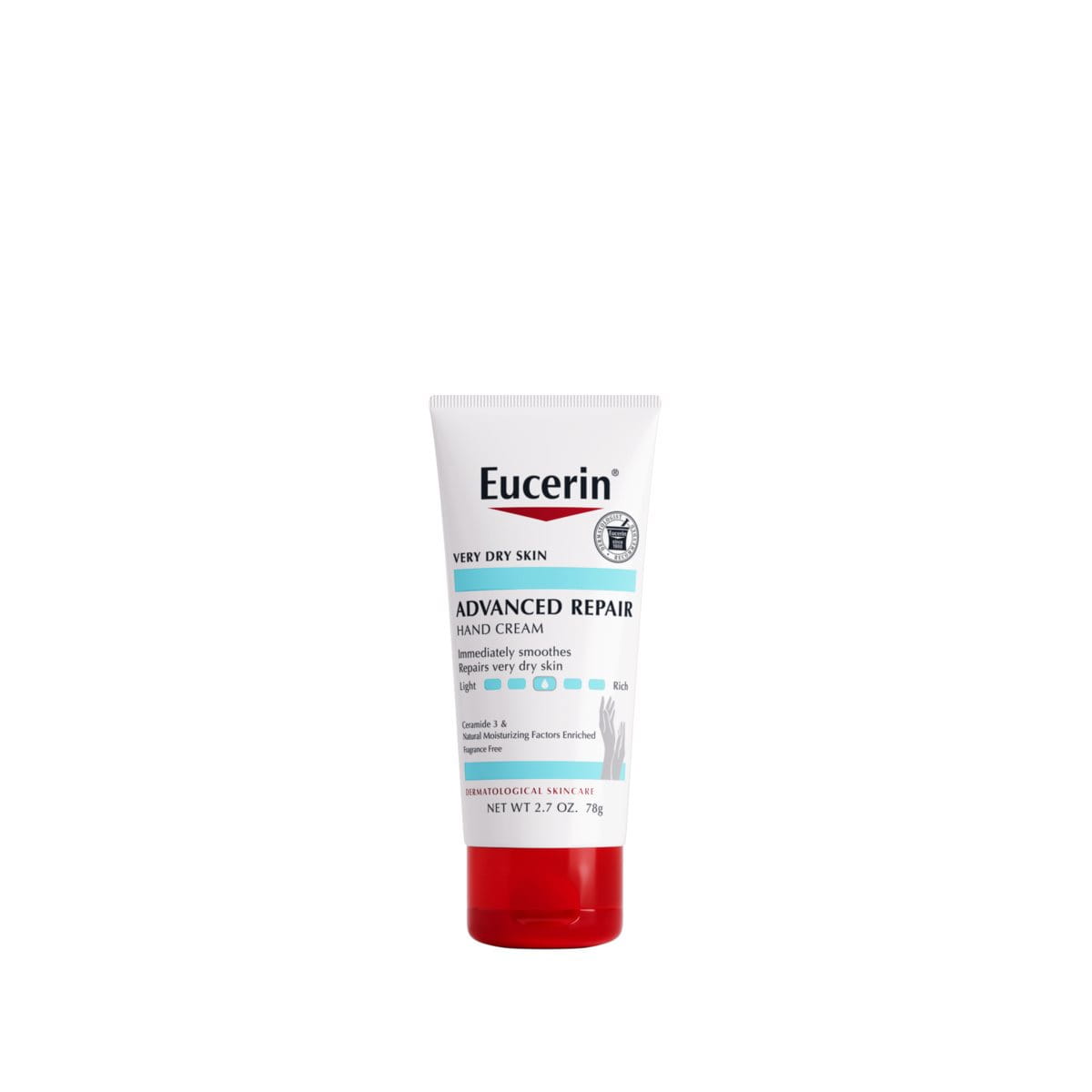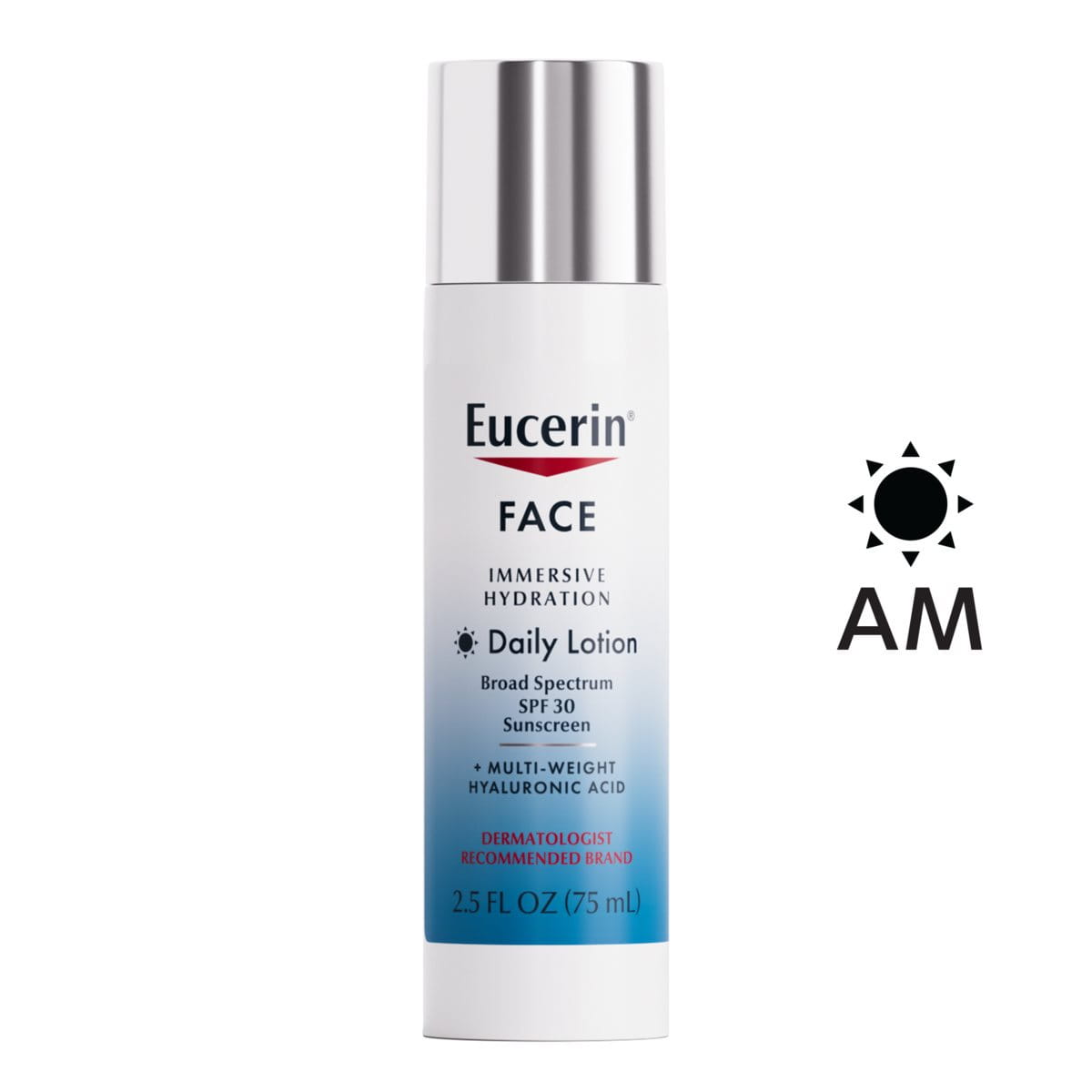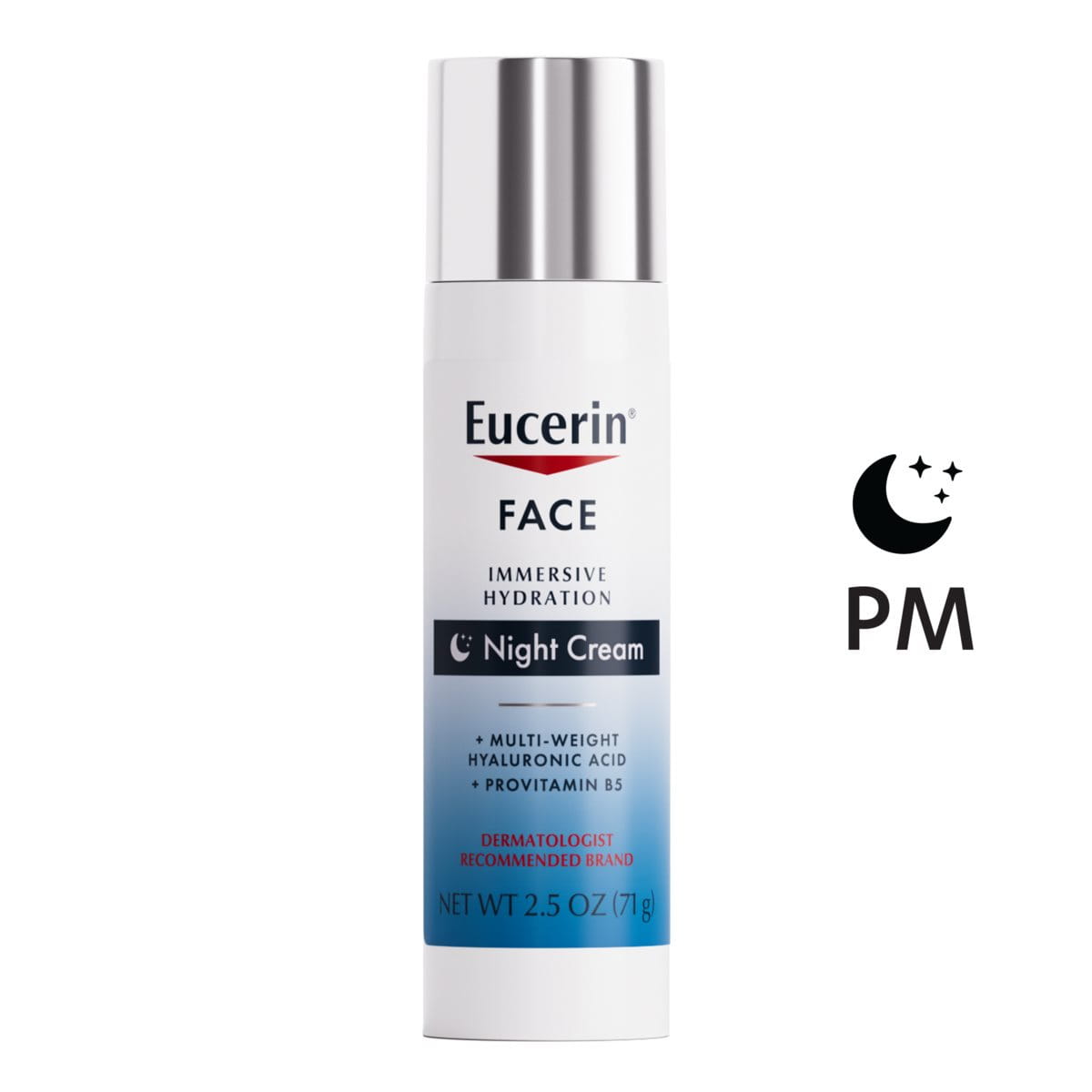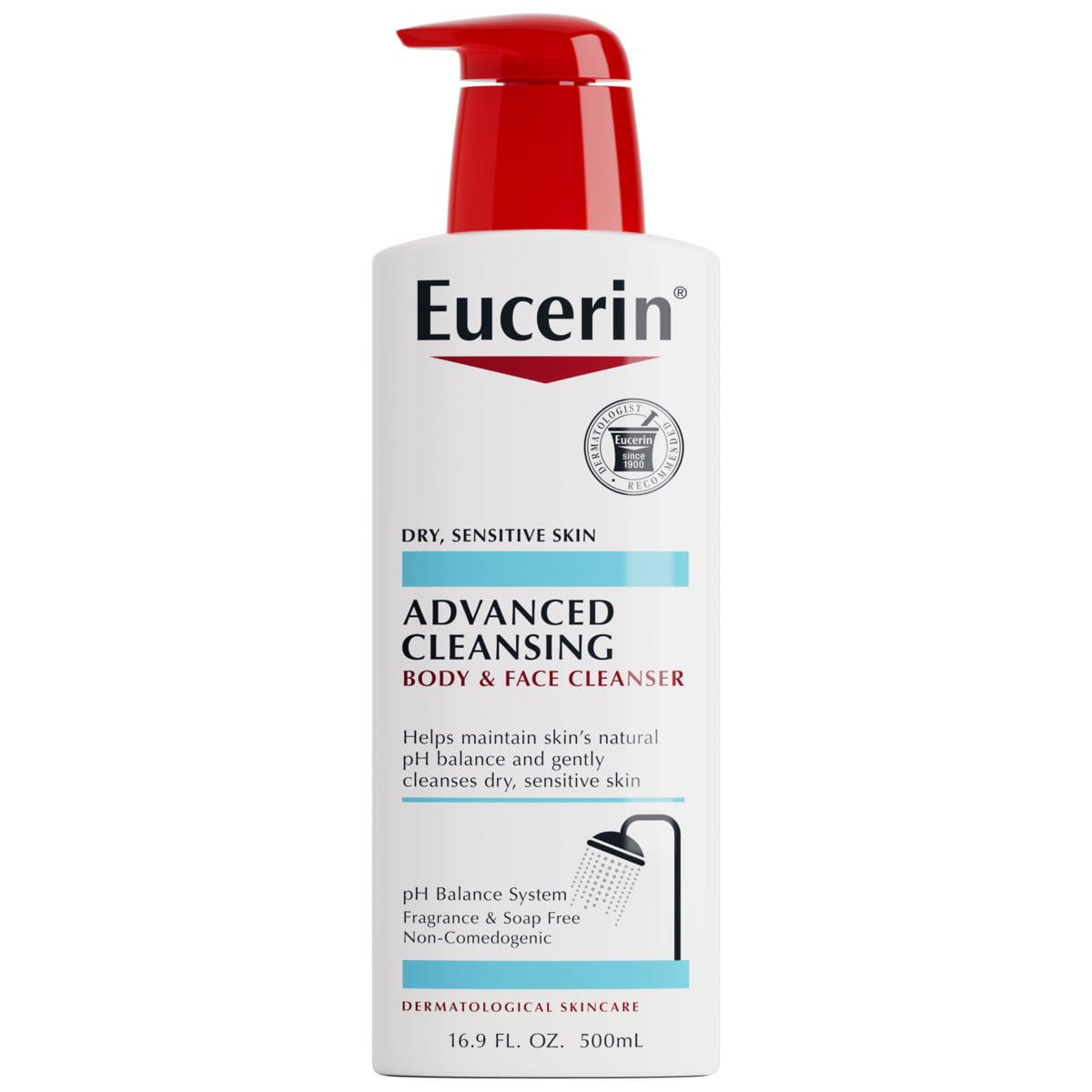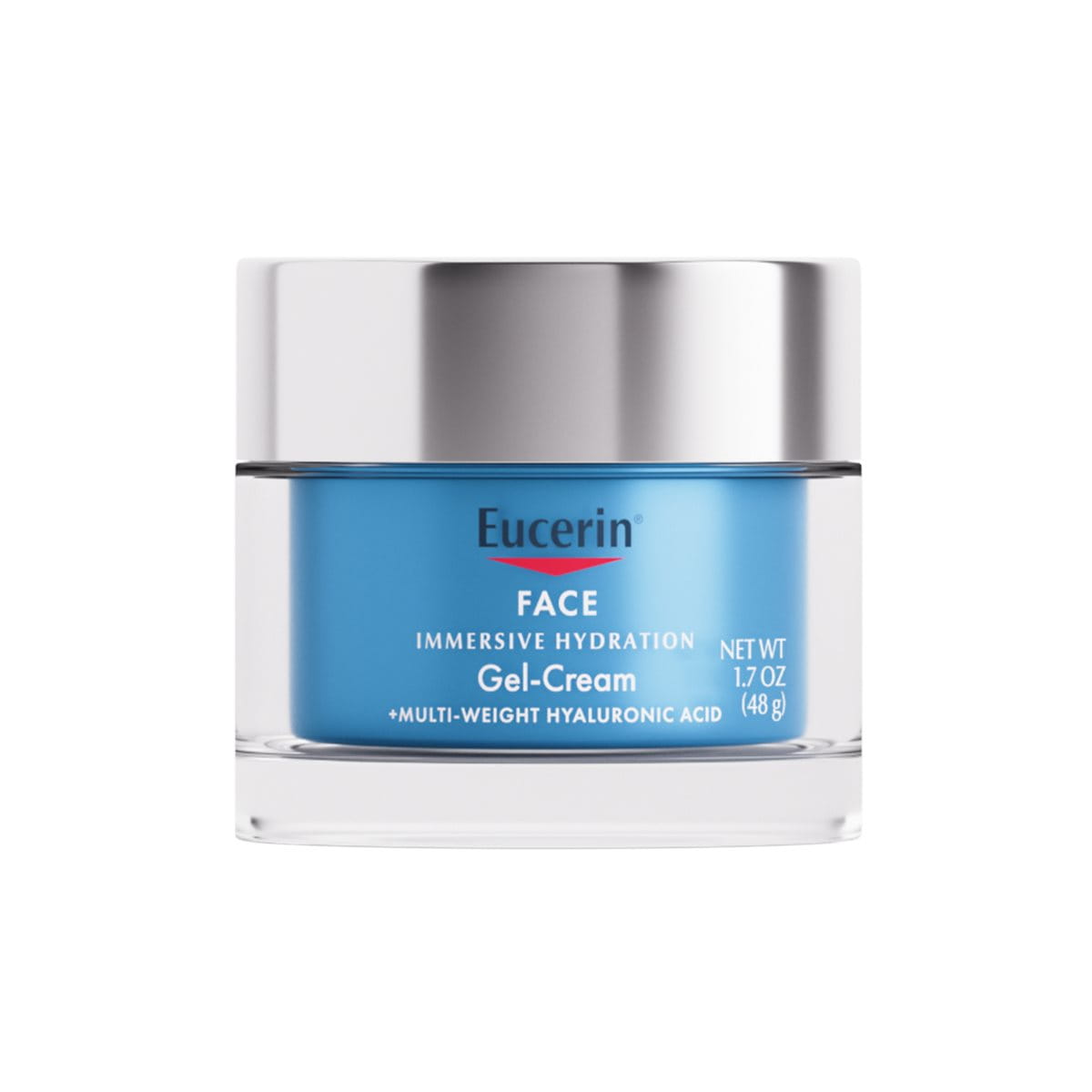Dry skin on the face can be difficult to hide. Our facial skin is one of our most important body parts, but when it becomes dry, it can feel rough and tight, and even become red, scaly and itchy. Dry facial skin can appear flaky or bumpy, making your complexion susceptible to other issues like sensitivity and redness.
Not all lotions and moisturizers are appropriate for dry facial skin, and the impulse to cover it up with makeup can make matters worse. Let’s take a look at the causes of dry skin on the face and what treatments are available to help relieve and prevent it.
Dry facial skin - signs & symptoms
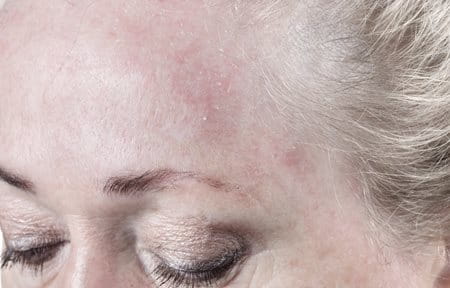
Dry facial skin is a common condition, although some people are more prone to it than others depending on skin type. The main facial skin types are:
- Normal skin type - this refers to skin that is neither prone to dryness nor oiliness. Many factors can cause normal facial skin to become dry, explained below under ‘What causes dry skin on face’.
- Dry skin type – dry facial skin typically feels tight and slightly rough in some areas.
- Oily skin type – oily facial skin is less likely to become dry, except in the case of excessive washing, or following a poor skincare routine. Oily facial skin is characterized by shininess and visible pores, and has a propensity for getting clogged pores and acne.
- Combination skin type – combination facial skin tends to develop dryness in certain areas of the face, particularly on the cheeks, whereas the forehead or T-zone is oily.
Symptoms of dry facial skin
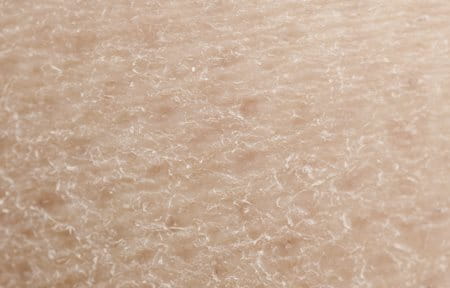
When dry patches on the face first become noticeable, the skin will feel dehydrated and tight and will worsen if left untreated, developing from dull and rough into flaky skin. It is not unusual for dry skin to only affect specific areas of the face, with many sufferers experiencing dry skin around the nose, mouth and forehead.
The T-zone is the area of your face that covers the forehead and the top of the nose, which are also the areas most prone to showing initial symptoms of dry facial skin conditions. Dry skin on the face and particularly the T-zone is commonly noticed during the winter and colder, dry weather.
Symptoms of extremely dry skin on the face
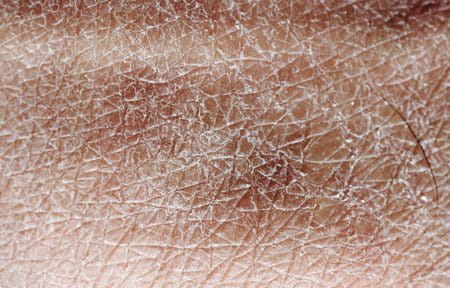
If initial symptoms of facial dryness are not treated, skin can become:
- Very tight
- Scaly
- Flaky
- Chapped
- Itchy
- Visibly red and irritated
Those with darker skin tones may notice ashy, gray-looking skin. Extremely dry facial skin can be mistaken for psoriasis on the face.
Dry skin on face and sensitive skin
When the face becomes dry, the skin will often also be sensitive; however, sensitive facial skin is not always related to dryness. If your skin is both sensitive and dry, it is always important to avoid skincare products that contain ingredients that may irritate skin, such as perfumes and dyes. Always check that any skincare product you intend to use has been dermatologically tested on sensitive skin.
Dry skin around eyes
Dry, Itchy, and flaky skin around the eyes, including under the eyes and on the eyelids, can be caused by a range of factors. The symptoms of dry skin around the eyes will differ depending on the severity and the cause of the dry skin.
When to seek medical advice about dry skin on your face
If you are worried or unsure about your dry skin symptoms, or they are becoming worse and causing significant discomfort, we recommend that you see your doctor or dermatologist for a face-to-face diagnosis.
What causes dry skin on face?
There are many internal and external causes of dry, flaky facial skin, all of which contribute to the same skin dehydration process. The severity of the dry facial skin will depend on the number and intensity of these dry skin risk factors.
Dry facial skin causes – external factors
The main external triggers of dry skin on the face are environmental factors and inappropriate facial skincare routines. The face is generally exposed to these external causes of dry skin much more frequently than the rest of your body. Things like temperature, wind, soaps, and cosmetic products can all influence the hydration level in your skin.
Let’s take a closer look at some examples of external and environmental contributing factors to dry facial skin.
Environmental contributors to dry skin on the face

- Harsh weather conditions – hot, cold and dry air
- Seasonal changes – dry skin symptoms are more common in the winter and summer months
- Ultraviolet (UV) light - Extensive and unprotected exposure to ultraviolet (UV) light can increase the rate of skin-aging, thus leading to premature [fine lines and wrinkles]. Avoiding excessive sun exposure and protecting your skin from UV damage can help prevent premature skin aging.
- Chlorine – dry skin can occur after coming into contact with chlorine in a swimming pool
Skincare routines and products that can contribute to dry skin on the face
- Frequent washing, or long, hot baths and showers remove many of the lipids that make up the skin’s moisture barrier.
- Inappropriate facial skincare routine – it is important to follow a routine and use products that are suitable for dry skin, avoiding strong soaps that strip away natural skin lipids.
Medications that contribute to dry skin
Some medications have the side effect of changing the water balance within the skin. Medications that control blood pressure, or diuretics, are known to have this side effect. Always check with a doctor or pharmacist if you are concerned that a medication may be contributing to dry skin.
How external triggers can cause dry facial skin

External triggers of dry facial skin cause the skin's natural lipid surface barrier to deteriorate. Once this lipid barrier is broken, moisture can evaporate from the skin, and vital, moisture-binding substances are easily washed out.
As these natural moisturizing mechanisms decline, the skin is not able to hold as much water and becomes dry until the moisture-binding substances are replenished and the lipid moisture barrier on the surface is repaired.
Internal factors that can cause dry skin

As well as the external and environmental factors that can contribute to dry skin discussed above, internal factors like genetics and biological processes can also cause dry skin on your face.
Genetic influences on dry skin
Every person has a unique set of genes which determine skin characteristics like pigmentation, moisture and lipid levels. This means that, under identical conditions, different people will have different moisture and lipid levels in their skin.
Hormonal influences on dry skin

Hormonal changes such as pregnancy, adolescence and menopause can affect the skin’s moisture balance. Dry skin on the face during pregnancy is common. Dry skin is a common result of reduced estrogen in the body, which occurs during menopause.
Age influences on dry skin
The skin’s ability to produce sweat and lipids decreases as we get older. This is due to a decline in the functioning of sebaceous and sweat glands in the skin. Increasing age leaves the skin more prone to dryness, and the drier the skin, the more prone it is to the formation of fine lines and wrinkles.
Diet
Skin requires a range of nutrients, unsaturated fatty acids and vitamins in order to function correctly. A lack of any of these can contribute to dry skin. Eating a healthy, balanced diet can help to keep the skin functioning normally.
Contributing factors to dry skin on face
In addition to the main causes of dry facial skin, several other factors also affect the severity of facial skin dryness. An awareness of these will help you avoid them and thereby reduce their impact.
Lack of effective dry facial skin treatment
If dry facial skin is not treated properly, or ineffective moisturizers are used, the dry skin condition is likely to become worse rather than improve. This is because the dryness progresses, affecting the moisture networks in the deeper layers of the skin. As these networks supply moisture to the upper layers of the skin, if they become compromised, the skin dryness will continue to worsen.
Sun exposure
Excessive sun exposure may increase facial skin dryness. It is therefore important to choose a sunscreen that is formulated for dry skin, which contains moisturizing ingredients in addition to providing broad spectrum protection with an appropriate Sun Protection Factor (SPF)
It is also vital that sunscreen, and any other skincare products used on dry skin, do not contain fragrances and colorants that may irritate skin: dry skin, especially dry facial skin, is more prone to irritation than normal skin
Occupational hazards
Certain situations or jobs involve exposure to conditions that may cause dry facial skin, e.g. outdoor sports, gardening, holidays in cold areas. By avoiding outdoor and occupational irritants and using adequate skin care products you can combat facial dryness caused by these factors.
Dehydration

The amount of moisture in the skin is related to the amount of water that the body can supply. When the body is dehydrated, therefore, it is unable to supply adequate amounts of water to the skin, leading to the development of dry skin.
People who are prone to dehydration include the elderly, as the sensation of thirst declines with age, as well as manual laborers and those who exercise regularly. Learn more about How to hydrate skin.
Smoking
The toxins in cigarette smoke, including nicotine, may reduce the blood flow. This results in a slower metabolism within the skin, causing skin to dry out and age prematurely.
How to treat dry skin on the face

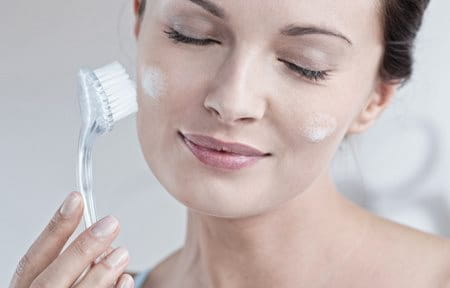
In addition to having a good cleansing and moisturizing skincare routine, avoiding factors that contribute to dry skin is important in helping to prevent and treat dry facial skin:
- Reduce the time spent in hot water by taking quick showers for between 5-10 minutes, instead of long baths. It's best to use warm, not hot, water when bathing or washing the face to avoid stripping the skin of its natural oils. Use a gentle and moisturizing cleanser and remember to apply a hydrating facial moisturizer after bathing. Pat your skin dry instead of rubbing it dry. Avoid showering or bathing more than once a day if possible.
- Avoid dry air by spending less time outdoors in hot and cold weather, and by using a humidifier indoors when the heat is on. Dry air, both hot and cold in temperature, can dry the skin out. Air conditioning and central heating units used indoors also remove moisture from the air and thus can dry the skin.
- Wear scarves, hats and gloves outside to help protect skin from cold air and the elements. Ttry to avoid fabrics that feel scratchy and rough.
- Use skincare products without fragrances, and colorants to help avoid irritation. Dry, and especially dry, sensitive skin is prone to irritation from these types of ingredients, so it is always best to use skincare products that have been dermatologically tested on dry & sensitive skin. Your laundry detergent should also be hypoallergenic and fragrance-free.
Dry and very dry skin on the face needs a comprehensive skincare routine to adequately replenish moisture levels. This includes using appropriate cleansers, moisturizers and sunscreens. Water-based skin cleansers with added moisturizing factors are typically suitable for dry to very dry facial skin, while oil-based cleansers are ideally suited for the care of very dry and extremely dry skin.
Facial moisturizer for dry skin
Moisturizers and creams can help replenish missing natural moisturizing factors, which attract moisture towards, and bind moisture into the stratum corneum (the upper layer of the skin). This helps prevent the skin from becoming dry, reduces roughness and alleviates tightness.
Apply a moisturizer for dry skin on face before bed, after washing it with a gentle cleanser
Gentle cleanser for dry facial skin
If your skin feels dry and tight after washing it, you may be using the wrong cleanser for your skin. Products containing colors, fragrances or soap can irritate skin. A mild but effective face wash for dry skin is an essential step to the rest of your dry skin skincare routine.
Eucerin Advanced Cleansing Body and Face Wash is a soap-free gentle cleanser that helps to preserve skin’s protective moisture barrier to prevent skin from drying out. It also supports an optimal skin pH (5 on the pH spectrum) and is specially formulated for dry, sensitive skin. It’s non-comedogenic (won’t clog pores), fragrance free and dye free.
How often should you wash your face if you have dry skin?
Washing dry facial skin too often can cause dryness and irritation to become worse. For most skin types, washing your face twice a day (morning and night) helps to remove the buildup of dirt on the skin, but washing dry skin once a day can be enough to keep the skin clean without drying it out further.
However, you should always properly clean your skin after wearing makeup, sunscreen and if you have exercised or your skin has become sweaty.
Exfoliating dry skin on face
Exfoliating our skin helps to remove dead skin cells, in turn reducing dry patches and smoothing skin's overall texture. Dry brushing is the process of using a dry brush against your skin to help remove dead cells from the skin’s surface. Although dry brushing is an effective way to exfoliate your skin, brushing too aggressively or too often can cause damage to the skin, causing or worsening pre-existing dryness. Because of this, dry brushing is not recommended for those with sensitive skin or dry skin conditions.
Dry skin sufferers should test a new exfoliator on a small area of their face before using it all over. Avoid exfoliating every day though, and apply a face cream for dry skin immediately afterward to help lock in moisture.
Caring for dry, aging skin
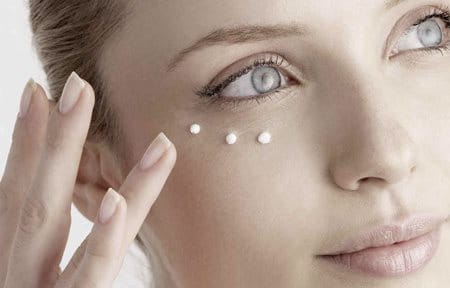
Caring for aging skin requires addressing the common causes of skin aging. As the skin ages, skin dryness and UV damage contribute to the development of [fine lines and wrinkles] and loss of skin volume, density and radiance. Aging skin often requires intensive skin hydration to reduce the appearance of, fine lines and wrinkles, and using a broad- spectrum sunscreen regularly can help prevent the development of, further signs of premature skin aging.
Hyaluronic acid is found naturally in the skin, has high water-binding capacities. As facial skin ages, the amount of free hyaluronic acid decreases in the skin. Using a daily facial moisturizer and night cream containing hyaluronic acid to intensively moisturize skin is an important step in a skincare routine for dry, aging skin.
The information provided herein is not intended to be medical advice. Nor is it intended to treat the underlying skin disease or condition. The information is provided solely to:
- Moisturize, soften and smooth dry skin
- Improve the appearance of the skin
- Achieve healthier-looking skin


